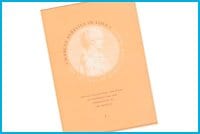The informative introduction to this delightful book of love letters draws us into the world of the elite in Imperial Rome. Round about the year 140CE, future Roman emperor Marcus Aurelius was an almost twentysomething living with his uncle Titus at Rome’s premier address, the emperor Hadrian’s palace. Titus decided that young Marcus needed a fatherly tutor to help groom him for his imperial future. Marcus Cornelius Fronto was brought in. It was the beginning of a steamy and fascinating courtship, recorded in letters the two exchanged for at least four years.
In her intro editor and translator Amy Richlin avoids claiming that the letters are proof of actual student-teacher sex. At the same time she underscores that ancient Roman society, compared to the earlier Greek tradition, took a much dimmer view of homo sex, especially between older and younger men. Given the prohibitive Roman erotic code, the letters are all the more surprising and precious for their open expressions of passion — unique, Richlin claims, in Greco-Roman antiquity.
The very first letter drives her point home with its jokey intimacy and closing raptures. Marcus is 18, Fronto in his mid-40s, but the words of student to teacher have a smartypants challenge in their tone that suggests a teen talking to his best pal. “If you get some sleep after the all-nighters you’ve been moaning about, please write and tell me.” After some digs to Fronto about his reading list, Marcus continues, “Gory homework you sent me!… the Caesar speech holds me down in its crooked claws.” Then books are abandoned for devotion: “Goodbye, breath of my life! Should I not burn with love of you…? What should I do? I can’t stop.”
Fronto’s encouraging reply, masked as admonishment, is couched in what Richlin calls “a literary exercise” — an imitation of the Greek “discourse-on-love” form. In scholarly language Fronto writes of beauty as higher than love, then makes it personal with a revealing declaration: “For my part you will be call’d a Beauty, but no He-Sweetheart.” The message is unmistakable: “You’re a hottie but don’t think for a moment that I’ll touch your willy.”
Marcus’s reply strips away the professor’s literary corset: “Go ahead, as much as you like, threaten me, accuse me, with whole clumps of argument, but you will never put off your Suitor — I mean me. Nor will I proclaim it any less that I love Fronto…. God, no, I am dying so for love of you, and I’m not scared off by this doctrine of yours.” Fronto melts at the challenge, replying, “Love me the most, as you do. I truly love to pieces every little letter of every word you write.” In the same letter he initiates a professional role reversal, seeking Marcus’s moral advice on a court case he’s involved in.
For those inclined to probe deeper into the historical context Richlin’s notes offer a feast of cultural tangents. They also pinpoint erotic meanings that bristle in the Latin subtext but elude expression in English. Richlin emphasizes the colloquial tilt of the letters by using the rhythms and vocabulary of our own time. One letter (following an illegible section in the original) opens with Marcus in mid-description of what sounds like a wrestling or massage session: “… and my personal trainer had me down by the gullet.” The notes defend the use of “personal trainer” with a tour through the connotations of the suggestive Greek word used by Marcus, “aleiptês,” which literally means “one who rubs with oil” — in this case probably a slave, says Richlin, working in a gym or at the baths. Exactly why or how he had Marcus by the throat remains deliciously mysterious.
A conspicuous (and uncredited) borrowing from Shakespeare left me scratching my head. Richlin translates Marcus as saying that Fronto’s love “knits up my ravell’d sleeve of care.” A note offers the literal translation: “It’s my consolation and cold compress.” Inserting an off-the-wall quote from Macbeth is a bizarre stretch here, both in content and literary context. Old Will deserves an apology.
Other passages allow the coded carnality of the writing to come through without interpretive embellishment. Here Marcus slips into his lonely bed, thinking of his absent honey: “Before I turn myself on my side to snore, I untangle my yarn load and render up an accounting of my day to my sweetest teacher.” Richlin comments that this “perhaps has sexual overtones.” Do you think?
The book is finally a touching demonstration of how little the world of male desire alters through the centuries. Keeping in touch with the boyfriend is a timeless imperative. Marcus was addicted to texting his sweetie.

 Why you can trust Xtra
Why you can trust Xtra


